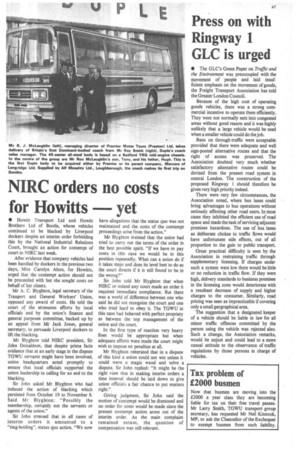Press on with Ringway GLC is urged
Page 53

If you've noticed an error in this article please click here to report it so we can fix it.
• The GLC's Green Paper on Traffic and the Environment was preoccupied with the movement of people and laid insufficient emphasis on the movement of goods, the Freight Transport Association has told the Greater London Council.
Because of the high cost of operating goods vehicles, there was a strong commercial incentive to operate them efficiently. They were not normally sent into congested areas without good reason and it was highly unlikely that a large vehicle would be used when a smaller vehicle could do the job.
Bans on through-traffic were acceptable provided that there were adequate and well sign-posted alternative routes and that the right of access was preserved. The Association doubted very much whether satisfactory alternative routes could be devised from the present road system in central London. The construction of the proposed Ringway 1 should therefore be given very high priority indeed, There were very few circumstances, the Association noted, where bus lanes could bring advantages to bus operations without seriously affecting other road users. In most cases they inhibited the efficient use of road space and made the task of servicing adjacent premises hazardous. The use of bus lanes as deliberate chokes to traffic flows would have unfortunate side effects, out of all proportion to the gain to public transport.
Great practical difficulty is seen by the Association in restraining traffic through supplementary licensing. If charges under such a system were low there would be little or no reduction in traffic flow. If they were high, delivery standards to business premises in the licensing zone would deteriorate with a resultant decrease of supply and higher charges to the consumer. Similarly, road pricing was seen as impracticable if covering only a small geographical area.
The suggestion that a designated keeper of a vehicle should be liable in law for all minor traffic offences committed by the person using the vehicle was rejected also. Such a change, the Association remarks, would be unjust and could lead to a more casual attitude to the observance of traffic regulations by those persons in charge of vehicles.
































































































































































